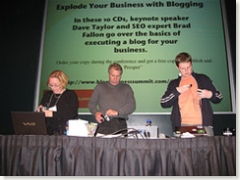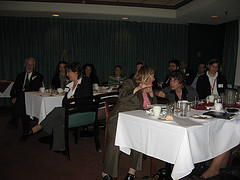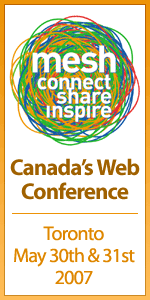 Matt Mullenweg and Liz Lawley closed out the Blog Business Summit with a look ahead to The Future of Blogging: Tools and Trends.
Matt Mullenweg and Liz Lawley closed out the Blog Business Summit with a look ahead to The Future of Blogging: Tools and Trends.
Liz Lawley:
Transparent functionality will be built into all tools. The easy integration of photos, videos, books, audio and collections that is offered in Vox, launched yesterday by SixApart, represents the new standard.
Liz also looks for a trend to Low Overhead Blogging: tools that enable you to easily add information into your blog. An early example of this type of tool is ShoZu, which enables you to easily move videos, photos and music while you are on the go.
The idea of Global Input will be hugely important. The ability to input from a mobile device. She points to Microsoft Aura! as the type of tool that will support this.
Selective Sharing will become an essential function. Sharing based on user defined groups. This also relates to Selective Publishing. As more people blog, they will demand a tool that enables them to selectively publish to one or another of their blogs.
Socially Filtered Search, the ability for me to filter my search results through my social network. When I am searching, I care more about what the opinion leaders in my space or my network think that I care about the universe as a whole. We need tools that let us build our own network for this purpose. And early entry into this space is the “Add me to your network” badge on del.icio.us.
 Matt Mullenweg:
Matt Mullenweg:
Blogging technology was developed ten years ago. What is different today is that there is a mass audience that is using and reading them.
It’s not about the technology. It’s about the audience. And with the larger audience, we are increasing the opportunities to publish.
Before, the publishing Internet was restricted to 1%. Now, more people are able to join in.
And this expanding audience and subset of authors will shape the future.
Discussion:
Liz Lawley: I predict that within five years the word blog will become as irrelevant as the word homepage has become. This will simply be a part of what we do.
Dave Taylor: The future of the web is conversation and social networking. This will not be tied to any single tool.
Matt Mullenweg: If we are successful, in five years you won’t know what WordPress. It’s elements will be incorporated in all platforms and their operation will be invisible to the user.
And the final word on design goes to ZeFrank.
 We have a great speaker lined up for the February Third Monday, Paul Wells of Maclean’s Magazine.
We have a great speaker lined up for the February Third Monday, Paul Wells of Maclean’s Magazine. Paul’s first book, Right Side Up, was published in late 2006. I’m only about a quarter way into it. But so far, it’s a pretty interesting, pull-no-punches read.
Paul’s first book, Right Side Up, was published in late 2006. I’m only about a quarter way into it. But so far, it’s a pretty interesting, pull-no-punches read.

 We have a great speaker – Mark Evans – to kick off Third Tuesday’s 2007 spring season.
We have a great speaker – Mark Evans – to kick off Third Tuesday’s 2007 spring season.
 As I began my presentation, I asked a few questions to gauge the knowledge and engagement level of the audience. And of these thirty people who had paid a lot of money to hear my presentation on sustaining a successful blog – how many actually had a blog? None. Zero. Nada.
As I began my presentation, I asked a few questions to gauge the knowledge and engagement level of the audience. And of these thirty people who had paid a lot of money to hear my presentation on sustaining a successful blog – how many actually had a blog? None. Zero. Nada. Here’s one session I hope the organizers include in this year’s program: “Social media, Corporate Brand and Personal Brand: The Employer’s Dilemma.”
Here’s one session I hope the organizers include in this year’s program: “Social media, Corporate Brand and Personal Brand: The Employer’s Dilemma.”

 Matt Mullenweg
Matt Mullenweg
